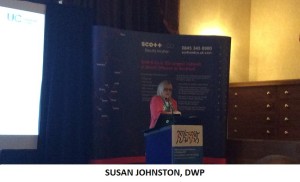For those that weren’t able to make it to the IRRV Annual Scottish Conference we thought we would share some of the key highlights and points discussed. This particular blog focuses on the sessions related to Universal Credit and Welfare Reform and takes a look at what the impact has been so far.
Universal Credit

Susan Johnston from the DWP provided an interesting update on where we are with the roll out of universal credit, noting that 50% of authorities do now have universal credit claims following its launch in February. She commented that universal credit was one of the biggest transformations to the benefits system in over 30 years with some of the guiding principles focused on abolishing the 6 different credits and transforming the culture of the benefits systems to encourage more people back into work.
Working in partnership with job centre plus is a key element of the programme’s success and so too is the roll out of a digital service to support it which is currently only available in a few places in England. Expected timescales for a full digital service were stated as being from March 2016 onwards with the timeline for full migration of all individuals including those on legacy benefits to universal credit by the end of 2019.
Welfare Reform
We then heard from Scott & Co on the challenges of collection and recovery after welfare reform. William Cameron noted that the full implications of welfare reform are as yet unknown and we are unlikely to see the full impact until next year. There was talk of their potentially being a new customer base and as such, new strategies and initiatives would be required. The implications according to William were that there was more rent and council tax to collect, increased costs to Local Authorities in terms of administration due to greater volume and an expected increase in court and enforcement action.
 Dealing with vulnerability is now a key issue with assessments being conducted on any conditions which might be preventing the customer paying. Typical initiatives that are being considered and implemented are the creation of welfare teams to assist with issues that arise when collecting debt. These teams would typically focus on repayment arrangements, supporting sheriffs, signposting customers to third parties and notifying the authorities of serious cases where further distress to customers may occur.
Dealing with vulnerability is now a key issue with assessments being conducted on any conditions which might be preventing the customer paying. Typical initiatives that are being considered and implemented are the creation of welfare teams to assist with issues that arise when collecting debt. These teams would typically focus on repayment arrangements, supporting sheriffs, signposting customers to third parties and notifying the authorities of serious cases where further distress to customers may occur.
Sheila Haigh from City of Edinburgh Council provided some insight into their own challenges and experiences in this area, noting that rental payments were more difficult to collect with 19% of tenants having never had to experience this responsibility before. Housing providers in Edinburgh are undergoing some restructuring to tackle customers non-payment having previously benefited from direct payment.
Since universal credit came into force, rent collection issues are arising and staff are more proactively having to contact those in arrears. The situation is not helped by tenants waiting to be led through the process rather than taking ownership.
Sheila notes that early intervention is critical and that the first rent payment which is missed is their trigger to act on.
Supporting Customers through Welfare Reform

Lastly we heard from Inverclyde HSCP (Health and Social Care Partnership) who talked us through their approach to supporting clients through welfare reform. Andrina Hunter, Service Manager stated that over 25% of children in Inverclyde were growing up in poverty and that Inverclyde had one of the highest levels of income deprivation in Scotland.
It is against this backdrop that they decided to redesign their approach to servicing and case managing customers, streamlining everything into one team and service. Inverclyde HSCP also set up a Financial Inclusion Partnership (FIP), consisting of a multi-agency group with a welfare reform steering group which had representation from the Finance and Benefits team as well as the DWP. This group focussed on putting in bids to secure local funding for projects, co-location of services and information share. So for example, the Housing benefits team will now get notification when a client is sanctioned and the client will then be contacted with hardship information by the team to stop arrears processes going forward if there is a genuine issue.
In summary Councils appear to be working harder to come up with innovative ways to help roll out universal credit and welfare reforms in a way that is fair to the citizen, but this is all still part of an ongoing process.
